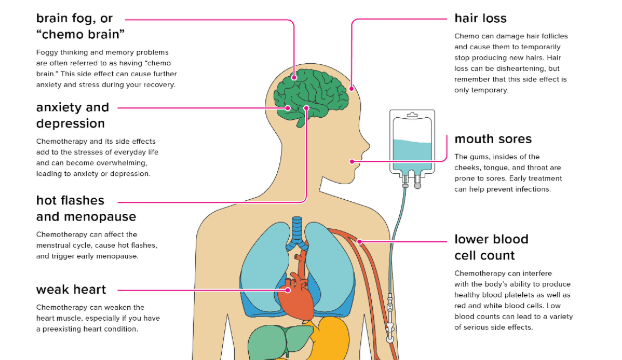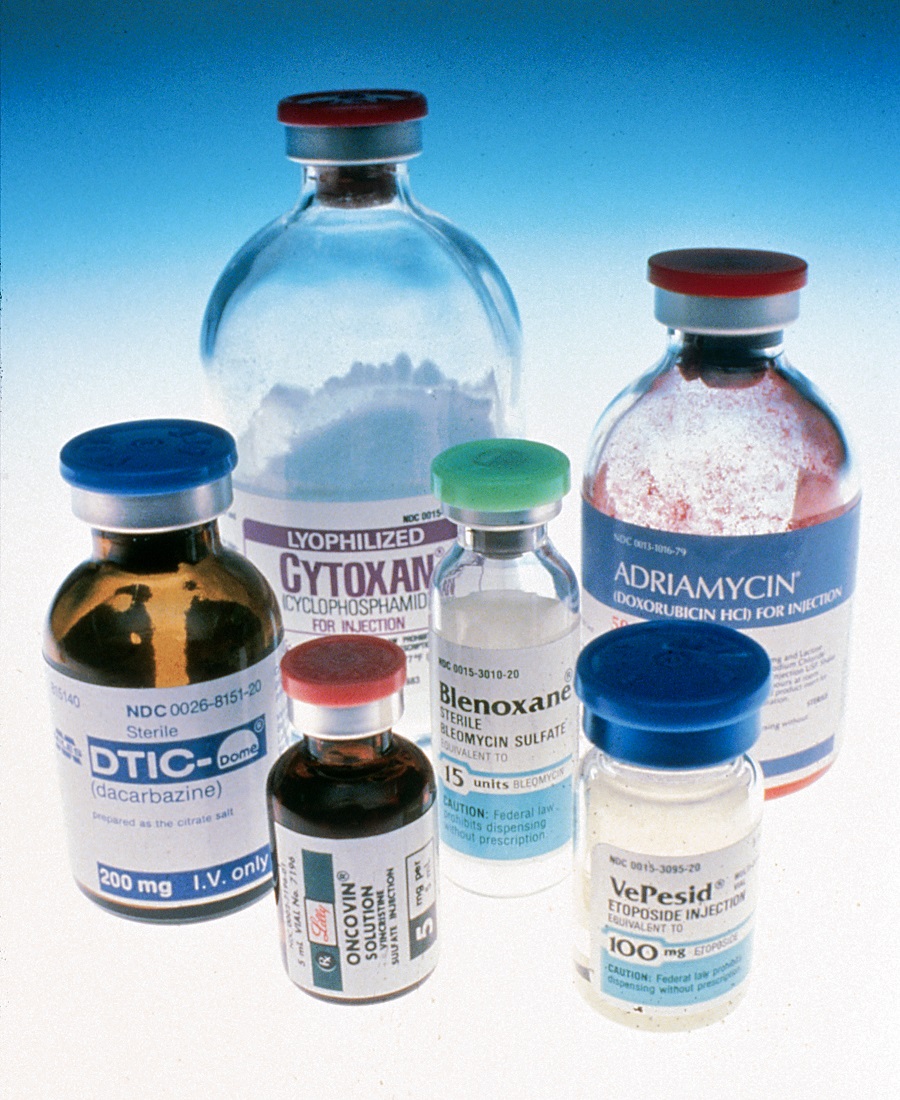Chemotherapy
Chemotherapy is a form of treatment in which drugs are used to treat certain conditions in your body. They are used for killing the cells that grow very fast in our body such as tumor cells. Thus, we can say that this method is used to treat cancer wherein tumor cells that grow without any control keep on spreading to the normal tissues of the body.
In chemotherapy, various drugs are used that can be used in a combination with others or alone. This way they kill the cancerous cells that can later affect other body parts. Although the method is effective in the treatment of various cancers, it does associate with many of the side effects that can be very uncomfortable for you. Some methods may even cause some serious complications that you should take care of.
Why it’s done?
Chemotherapy may be used to treat your cancer in most cases. The drugs present in this therapy are effective in killing the tumor cells. There are several reasons for which the chemotherapy may be used, which mainly include:
Your doctor may order chemotherapy to treat your cancer without using other forms of treatment.
It may also be used to kill the remaining tumor cells that remain after another used treatment option.
It may also be used to kill the tumor cells that are hidden. Your doctor may use chemotherapy along with other forms of treatment.
It may also be used to prepare you for other treatments. Chemotherapy helps to shrink the large tumor, which makes it easier for your doctor to remove the remaining size of the tumor.
Sometimes, chemotherapy is used to ease your signs and symptoms that give comfort to the patient by killing many of the tumor cells.
.
Chemotherapy for conditions other than cancer
At the same time when tumor cells can be killed with this form of treatment, it can also be used to treat some other conditions in the body. For instance:
Bone marrow diseases. Stem cell transplant is a technique that is used to treat diseases that affect the blood cells and the bone marrow. Your doctor may use chemotherapy to prepare for the main bone transplant.
Immune system disorders. Sometimes, your doctor may use weaker doses of chemotherapy to control your immune system that is overactive because of certain reasons to treat conditions such as rheumatoid arthritis and lupus.
Risks
Although, the technique is a boon for treating many conditions at the same time it has some potential risks associated with it. Thus, you should always ask your doctor to tell you more about your condition. That would prove helpful for you.
Besides, the extent of signs and symptoms will depend upon the type of drug that has been used. The more common signs and symptoms associated with the chemotherapy include:
Vomiting
Loss of hair
Diarrhea
Nausea
Sores in the mouth.
Loss of appetite
Fever
Pain
Constipation
You get bruises easily.
Bleeding.


Most of these signs and symptoms are not that serious as they can be treated easily or cause any serious complications. Many of these signs and symptoms are not that complicated, as they do not cause any serious signs and symptoms. Other than this certain symptoms are very serious and may cause some great complications. These include:
Lung tissues are damaged.
Problems in the heart.
Kidney issues
Infertility.
Damage to the nerves
You may develop more cancers.
How should you prepare?
The types of drugs that are used in chemotherapy will decide how you should prepare for your chemotherapy. You may need to follow certain instructions that include:
Insertion of the device before the chemotherapy. Intravenously, the chemotherapy is given through a vein using some specific device such as a port, pump, or a catheter. In this procedure, some devices such as a catheter are Implanted into the large veins of your body. This way the drugs used in chemotherapy are given via a device.
Tests. Before going for the procedure, you might have to undergo various tests so that no major complications develop. Your doctor may order some liver tests and kidney tests that are necessary for knowing about any future complications. Pay a visit to a dentist. You may need to visit a dentist for a proper checkup. This helps to reduce the complications to a greater degree than would otherwise cause problems soon.
Prepare for side effects. You should know in advance if there is any probability of a future infection. For instance, if there is a probability of infertility, then you may opt for preserving the eggs or sperms for use in the future. You may plan for a head covering if there is a chance of hair loss because of chemotherapy.
Arrange help at home or work. Because of chemotherapy, you may need to pay regular visits to your doctor, thus you can just compensate for your time by asking for help from your friends and colleges.
Preparing for your first treatment. You can ask your doctor how to prepare for the chemotherapy. You should take proper rest before visiting your doctor for the chemotherapy and take a light meal before the procedure to avoid any complications.
Get support from your family members. It is quite important to get the support of your family when it comes to deal the procedure.
What to expect from your doctor?
Depending on the type of drug that your doctor is going to administer, your doctor will choose a particular type of chemotherapy that will depend upon.
The type of cancer that you have
Stage of your cancer
Your overall health.
Any earlier type of cancer treatment.
Your preferences and goals
How you will receive your chemotherapy.
There are various ways in which your doctor may give you chemotherapy. These include:
Chemotherapy infusions. Your doctor may administer chemotherapy directly as an infusion into your vein that is intravenous. In this procedure, your doctor may insert a tube into your vein with a needle.
Chemotherapy pills. Many chemotherapeutic drugs can be taken as pills or in the form of capsules.
Chemotherapy creams. Sometimes, a doctor may recommend his/her patient certain creams that contain drugs used in chemotherapy. They are simply applied to the skin to treat skin cancers.
Chemotherapy shots. As you receive shots, in the same way your doctor may administer shots into your body using a needle.
Applying drugs directly to the area of cancer. Sometimes, your doctor may directly apply chemotherapeutic drugs to a particular body such as intrapleural chemotherapy (applied to the chest cavity), intraperitoneal chemotherapy (abdomen), or intrathecal chemotherapy (central nervous system).


How usual you receive the treatment with the chemotherapy.
Based on the type of drugs that you are receiving, your doctor may determine how often you receive the chemotherapy. It will also depend on the type of your tumor and the type of response that your tumor shows. Thus, the schedule for your chemotherapy varies. Furthermore, the chemotherapy that you take may be continuous or periodic. It may be used continuously when the tumor is growing or stopped growing.
Where you can receive your chemotherapy treatment.
A patient may receive the chemotherapy under the proper guidance at various places that include:
In the hospital
In the office of your doctor.
At home, if you are taking the chemotherapy pills.
Results
You may need to regularly pay the visits to your doctor after you have the chemotherapy, as your oncologist may try to know more about your signs and symptoms if there are any.
In some cases, your doctor may monitor your situation by ordering you for scans and other tests. These tests may give your doctor an idea about whether your cancer is responding or not.
